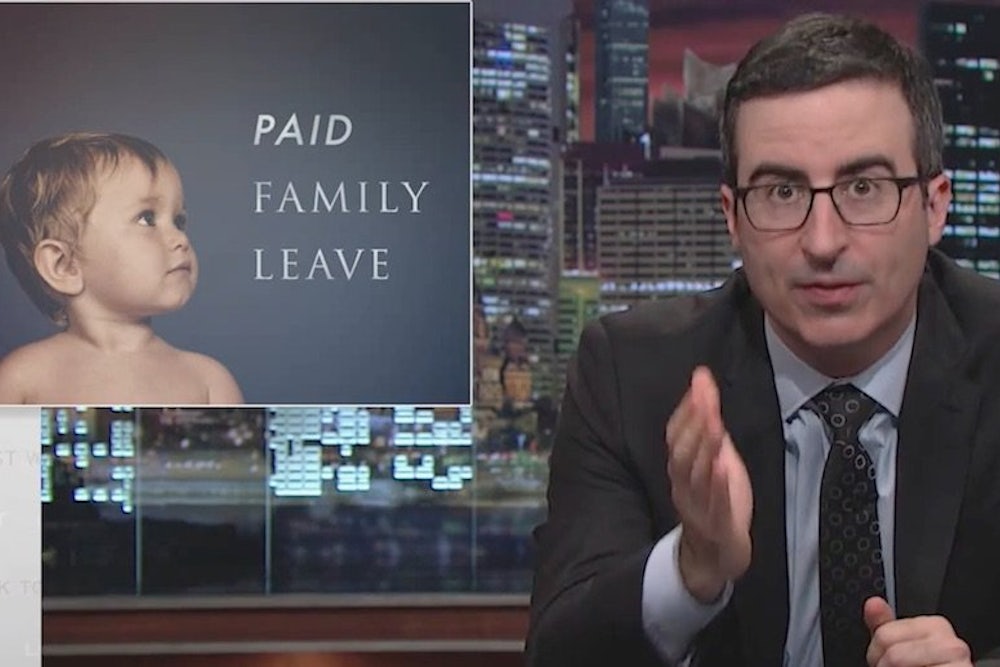John Oliver’s Mother’s Day segment this Sunday opened with a glimpse into what businesses are willing to take in the name of motherhood (namely: your money, on this shamelessly Hallmarkian holiday) versus what they’re willing to give: paid maternity leave.
Oliver pointed out that the United States is singular among developed nations in its complete failure to provide any paid leave to mothers whatsoever. Globally, we are joined only by Papua New Guinea in our lack of paid maternity leave policy, according to data collected by the International Labor Organization, a United Nations agency.
Unlike mothers in countries with mandates providing paid maternity leave—The Netherlands, for example, where women are guaranteed 16 weeks of paid leave, or Norway, where women can take 36 weeks—women in the U.S. often patch together a mishmash of vacation time, sick days, and whatever maternity leave is available from their workplace to eke out time to care for their newborns.
Oliver observed, quite rightly, that the meager twelve weeks of unpaid leave currently mandated by the federal government spooked employers when proposed in 1993. Businesses’ allergy to any kind of regulation, Oliver proposed, helps explain why America has fallen so far behind when it comes to paid family leave. California’s paid maternity leave mandate hasn’t introduced chaos or even inconvenienced businesses in the state; nonetheless, only three states have enacted similar legislation.
It is a scandal that, in a nation where family values feature so prominently in political discourse, there is barely a shred of protection for working women who give birth. Worse, even the weak provision of twelve weeks unpaid leave doesn’t extend to some women, as Demos senior fellow Caroline Fredrickson points out in her new book Under the Bus: How Working Women are Being Run Over. Women who work part-time, for small businesses, and immigrant women often in domestic work are left out of our leave mandates. Unfortunately, the women who happen to be excluded from these protections also happen to be the poorest workers, a reality that leads to dire conclusions: “[I]n almost 9 percent of cases where [families] go under the poverty line, the precipitating factor was the birth of a child,” Fredrickson notes, “and nearly 25 percent of these families succumb to poverty in thirty days when they are dependent on the earnings of a single mother.” Fredrickson also reports that a study of 1,700 bankruptcy cases conducted by Human Rights Watch found that 7 percent of debtors identified the birth of a child as their reason for going bankrupt.
With numbers like these, it’s a wonder nobody has made paid family leave a campaign issue yet. But Hillary Clinton is aiming to fill that gap. On Mother’s Day, Clinton’s campaign posted a two-minute video detailing Clinton’s respect for her mother, her role in her daughter and granddaughter’s lives, and her support for paid leave. “It is outrageous that America is the only country in the developed world that doesn’t guarantee paid leave,” Clinton says, her voice set to a montage of family photographs and her own meetings with constituents’ kids and babies. “We know,” Clinton adds, “that when women are strong, families are strong.”
Fredrickson’s data on childbirth and poverty seem to bear out Clinton’s claim: When women are well supported in terms of paid leave, families have a better shot at staying above the poverty line, which is good news for parents and babies. The Right may have a traditional claim to the politics of strong families, but unless they can stake out a position that will offer the kind of protections to mothers that Clinton has in mind, the pro-family rhetoric of the Right will remain nothing but talk.
